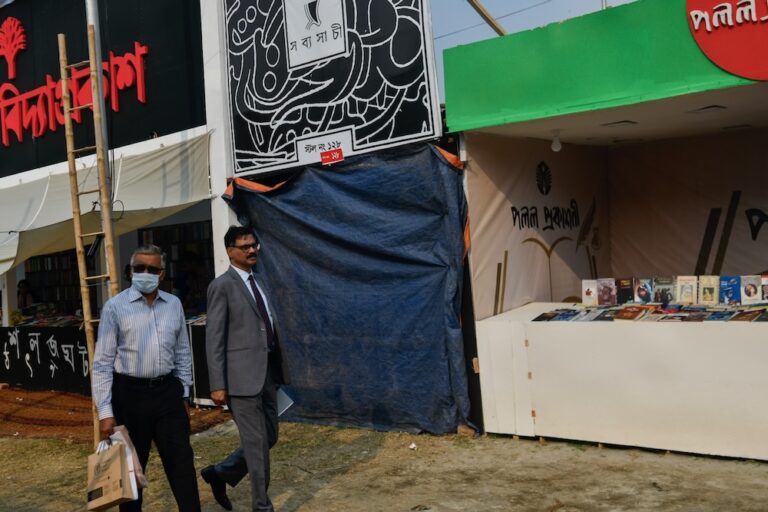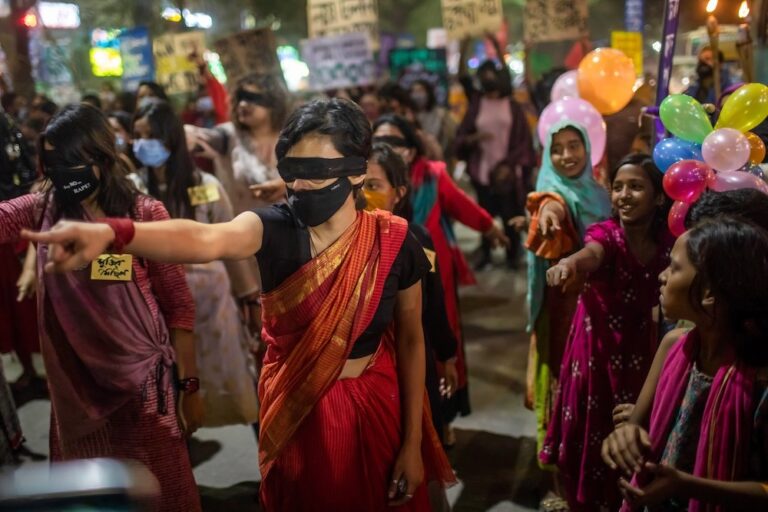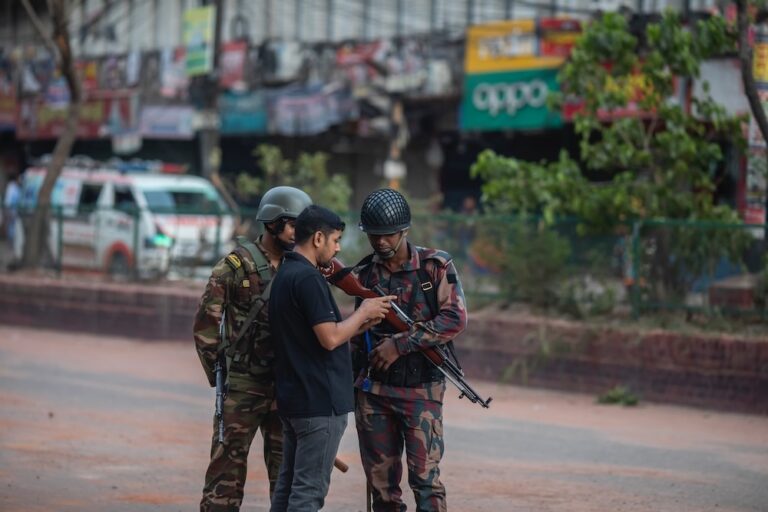(RSF/IFEX) – In a letter sent to Information Minister Abdul Moyeen Khan, RSF expressed its concern over government pressure on “Dainik Janakantha” newspaper. “Withdrawing government advertising, shutting down the print facility’s electricity, jailing one of the newspaper’s staff members and failing to punish attacks against the independent paper’s journalists all constitute proof that the government […]
(RSF/IFEX) – In a letter sent to Information Minister Abdul Moyeen Khan, RSF expressed its concern over government pressure on “Dainik Janakantha” newspaper. “Withdrawing government advertising, shutting down the print facility’s electricity, jailing one of the newspaper’s staff members and failing to punish attacks against the independent paper’s journalists all constitute proof that the government is harassing ‘Dainik Janakantha’,” noted RSF Secretary-General Robert Ménard. The organisation urged the minister to order a halt to these repeated attacks against the newspaper. RSF also demanded Shahriar Kabir’s release. The regular contributor to “Dainik Janakantha” has been imprisoned since 22 November 2001 on charges of “sedition” (see IFEX alerts of 4 January 2002, 26 and 23 November 2001).
“Dainik Janakantha” newspaper has been particularly affected by the violent acts against the press. According to RSF’s statistics, in 2001, at least eight of the daily’s journalists were assaulted and twelve others were threatened.
Based on information gathered by RSF, on 16 January 2002, DESA, the company that supplies Dhaka with electricity, cut off power to “Dainik Janakantha”‘s printing facility in Dhaka. According to one DESA employee, the order to cut the power “came from the top.” For its part, the daily affirms that it was never warned of the power shutdown and had paid its bills. Despite the power outage, “Dainik Janakantha” was printed as usual, thanks to its backup generators. Its management denounced this move as yet another attack by the authorities on the newspaper, which has been criticising government policies under the leadership of Begum Khaleda Zia.
The government stopped buying advertising space in “Dainik Janakantha” on 22 November. This followed the publication of articles about the harsh abuse allegedly perpetrated by members of the ruling party against Hindu minorities and Awami League militants. In an editorial published on the daily’s front page, the editorial staff affirmed that this decision came from the highest government level, and not from the Film and Publications Department, which “simply carries out orders.”
Furthermore, in early January, the government modified its press copy distribution to Bangladesh embassies worldwide. The number of copies of the newspapers “Dainik Janakantha”, “Dainik Prothom Alo”, “Dainik Jugantor” and “Dainik Sangbad” dispatched by the minister of foreign affairs was considerably reduced. These four publications are known to be critical of the ruling coalition.
On 14 January, Kabir Uddin Hannu, an elected official from a village in southern Bangladesh affiliated with the ruling Bangladesh Nationalist Party (BNP), and his henchmen violently assaulted Shawkat Milton, a “Dainik Janakantha” staff correspondent in Barisal. On the morning of the assault, the journalist, who is also a press freedom activist, wrote an article for the daily implicating Uddin Hannu in the fraudulent takeover of a local bank. Two reporters were also assaulted in the incident.
Several days earlier, on 8 January, armed activist members of the BNP’s youth movement assaulted Reazzudin Jami, a “Dainik Janakantha” correspondent in Brahmanbaria (eastern Bangladesh). The individuals broke into the offices of the local daily newspaper “Dainik Brahmanbaria”, where Jami was working. They vandalised his office, assaulted the journalist and attempted to abduct him. In response to the protests of some of the newspapers’ employees, the militants eventually left the premises, threatening the journalist with reprisals if he “failed to perform his work objectively.” The activists resented the publication of a series of articles about their movement. Jami filed a complaint with the Brahmanbaria police department.
Finally, the investigation into the assassination attempt against Probir Shikder, a “Dainik Janakantha” correspondent in Faridpur (west of Dhaka), has remained unresolved, despite the assurances of government authorities. The journalist, who lost a leg as a result of the attack, accused businessman Musa Bin Shamser of financing the attempt on his life. A delinquent arrested by police admitted that Bin Shamser’s brother had hired him to assassinate Shikder and one of his associates. Despite these revelations, the businessman was never interrogated. On 14 January, Faridpur judges ordered the police to reopen the investigation after Shikder filed a complaint, contesting the first inquiry’s conclusions.


